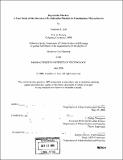Beyond the market : a case study of the downtown revitalization paradox in Framingham, Massachusetts
Author(s)
Leit, Jonathan A
DownloadFull printable version (10.46Mb)
Alternative title
Case study of the downtown revitalization paradox in Framingham, Massachusetts
Other Contributors
Massachusetts Institute of Technology. Dept. of Urban Studies and Planning.
Advisor
J. Phillip Thomson.
Terms of use
Metadata
Show full item recordAbstract
U.S. communities have a long history of implementing redevelopment projects based on the displacement of vulnerable minority groups, who have been blamed for physical blight, depression of property values, and stripping neighborhoods of life. In the early 21 t century, with recent immigrants to the U.S. largely bypassing major urban areas for suburbs and small cities, these new destinations now face "urban" pressures in devising redevelopment strategies and plans. The town of Framingham, Massachusetts is a suburb in the Boston metropolitan area that is confronting this challenge as it seeks to revitalize a downtown dominated by a substantial immigrant commercial presence. The town's revitalization process highlights a new variation on a common historical theme of the oftentimes damaging impact of redevelopment projects. This thesis examines the ongoing revitalization process in downtown Framingham in order to understand the paradox that the Brazilian immigrant businesses largely responsible for occupying storefronts, returning street life and vitality, and attracting investment to a once depressed district are now being displaced in the very name of revitalization. (cont.) Framingham is pursuing a gentrification model for redevelopment based on a large-scale construction and rehabilitation project that will remake downtown's identity and significantly displace the immigrant business community, rather than an incremental approach under a long-term vision that would preserve and build on the downtown immigrant economy. Given that these are two economically viable models, this thesis argues that the revitalization paradox in Framingham cannot be adequately explained by the market dynamics commonly cited. Rather, social, political, and organizational factors have been equally, and perhaps more, significant in determining the revitalization model being implemented. Specifically, these determinants are 1) exclusive social values that have discriminated against minority groups and resulted in a limited vision for downtown; 2) political institutions and regulatory processes that lack leadership, accountability, and efficiency; and 3) fragmented downtown organizations and relationships that have hindered the promotion of an alternative revitalization model. (cont.) In the course of this argument, I challenge contemporary planning theory by demonstrating that the application of the profession's ideals of mixed-use, high density, historic preservation, affordable housing, and transit-oriented development can actually be quite damaging for local communities and thus require constant attention by planners concerned with equitable development principles in the local context.
Description
Thesis (M.C.P.)--Massachusetts Institute of Technology, Dept. of Urban Studies and Planning, 2006. Includes bibliographical references (p. 125-131).
Date issued
2006Department
Massachusetts Institute of Technology. Department of Urban Studies and PlanningPublisher
Massachusetts Institute of Technology
Keywords
Urban Studies and Planning.